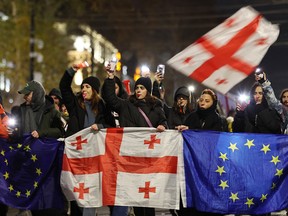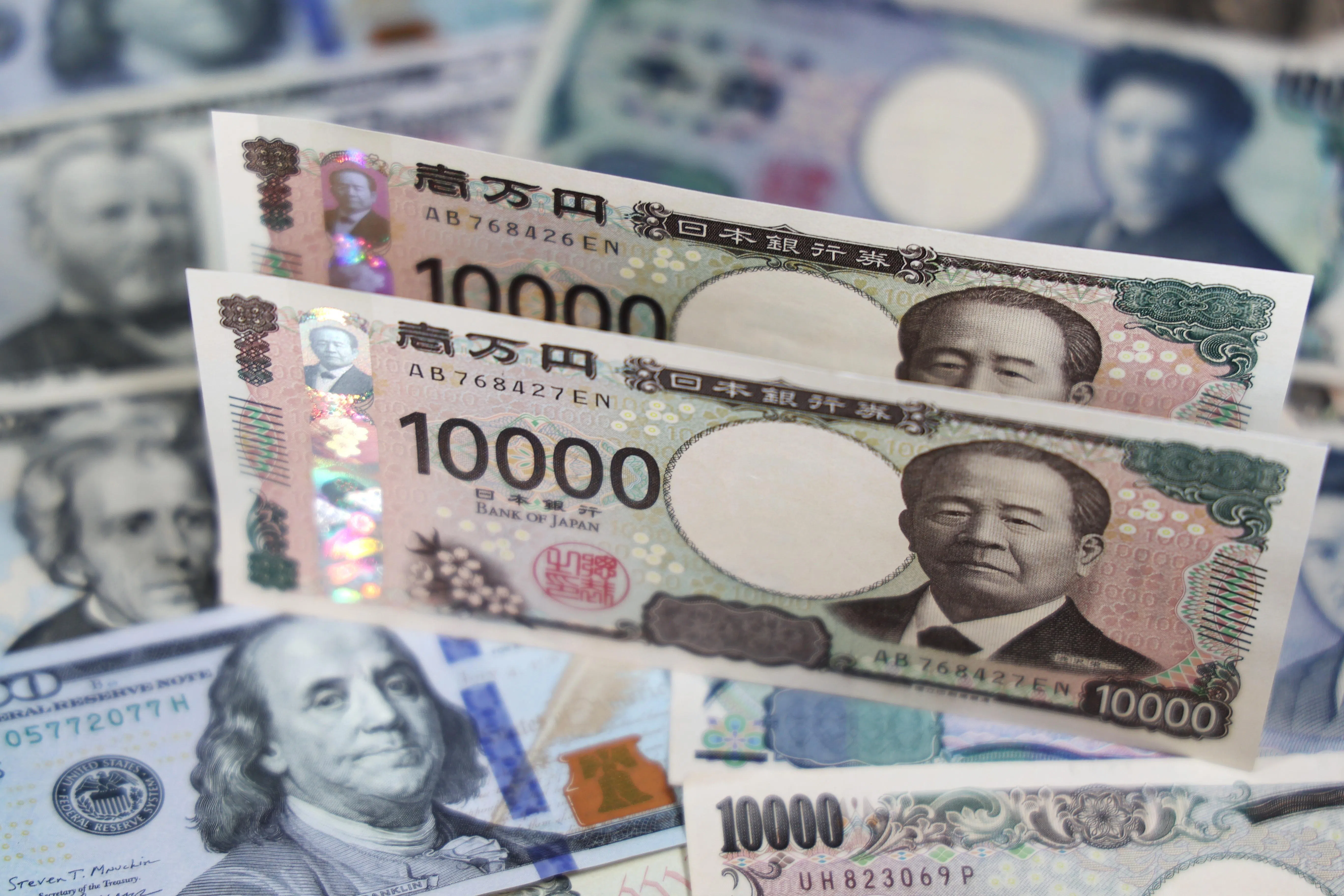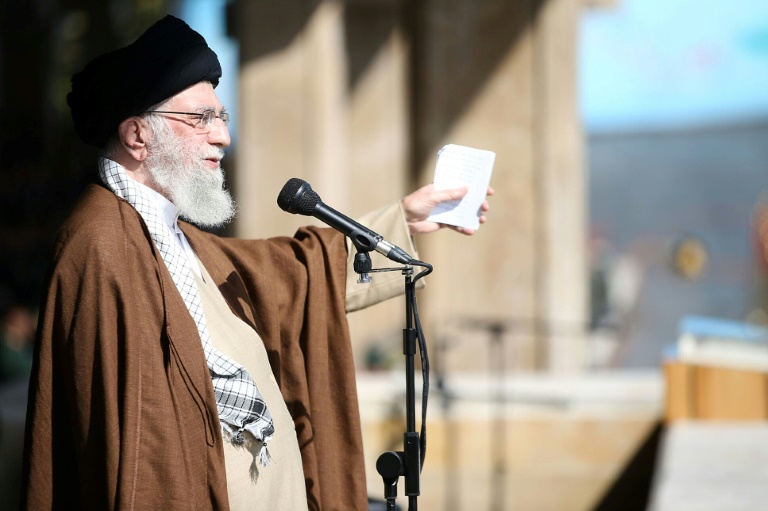Protesters in the former Soviet republic are calling on Canada to ‘publicly condemn backsliding in Georgia’ and support its European Union entry
Article content
Weeks of violent protests in Georgia against alleged vote-rigging and the suspension of talks to join the European Union have left the former Soviet republic mimicking Ukraine 10 years ago — streets filled with fear, distress and panic over Russian interference.
Article content
Article content
The nation of 3.7 million people has been rocked by protests in Tbilisi against an increasingly authoritarian government. Georgian Dream, a pro-Russia party, was re-elected in the Oct. 26 parliamentary elections — amid widespread allegations of vote buying, voter intimidation and other voting irregularities reported by the OSCE Office for Democratic Institutions and Human Rights (ODIHR).
Advertisement 2
Article content
“We are straightforwardly moving towards Russia,” activist Maya Purtskhvanidze of the Georgian Women’s Initiative Group told the National Post.
On Nov. 27, Georgian Dream — which is in its 12th year in power — announced it would halt accession talks with the EU until 2028, despite promises enshrined in its constitution to pursue full integration into the EU and NATO.
This was in response to a European Parliament resolution criticizing the election as unfair.
The Canadian government issued its own Oct. 28 statement on the need for “free, fair, and independent elections” in democratic societies.
“Canada remains open to cooperation with Georgia, as long as the Georgian leadership respects democracy, human rights, rule of law and addresses the recent democratic backsliding,” the statement said. “We call for calm by all parties and for the Georgian authorities to respect the rights and security of individuals in the context of peaceful protests.”
Although tensions have been brewing for months, the EU suspension announcement triggered a fresh wave of protests met with an increasingly violent response in the past few days — tear gas, water cannons and police beatings.
Article content
Advertisement 3
Article content
“They’re arresting doctors, beating journalists, and threatening to close down the opposition media,” Purtskhvanidze said. “I do remember the time when the Soviet Union was collapsing and they were dispersing demonstrators, but they never did anything like this.”
“This is brutal.”

The Public Defender of Georgia, a constitutional institution independent from the government, in recent weeks visited 327 people who were detained and injured during the protests. Of the 327, 225 indicated ill-treatment from the police, and 157 had visible injuries.
“The criminal acts of inhuman and degrading treatment and targeted persecution of peaceful protesters, as depicted in the video footage distributed by the media, are disturbing,” said the Public Defender of Georgia in a statement on Nov. 29.
“The video footage and information released clearly reveal numerous episodes of unjustified use of special equipment against protesters, including politicians, as well as journalists and detainees, cases of alleged unjustified detention, direct intent to commit violence, and targeted persecution during the dispersal of the peaceful protest.”
Advertisement 4
Article content
Moreta Bobokhidze, an activist in Georgia, has attended protests for the past 15 days and insists demonstrators have been unarmed and peaceful.
“I don’t know why the government thought they had to use force.”
Andro Chichinadze, a 28-year-old film and theatre actor, was arrested on Nov. 5 after 60 police showed up to his house, according to his mother, Lika Guntsadze. He was arrested on charges of organizing, leading, participating and publicly calling for violence.
“He was just standing in the front line, right in front of the police or the mob, because there were girls he was trying to protect,” Guntsadze says.
The arrest, among many others, appears to be part of government efforts to suppress peaceful protest, intimidate the public, and “target positive faces,” according to Purtskhvanidze.
“They could have arrested him during the demonstration, but no. They specifically organized this home arrest and created this propaganda around him as if they were investigating something.” said Purtskhvanidze.
“For so many years, people were patient, or trying to be patient, because they didn’t want to fight on the street, they didn’t want to demonstrate,” said Purtskhvanidze. “They wanted peaceful development.”
Advertisement 5
Article content
Many observers believe Georgian Dream’s decision to suspend EU accession talks would make Georgia increasingly vulnerable to Russian interference.
“By suspending Georgia’s EU accession process, Georgian Dream has rejected the opportunity for closer ties with Europe and made Georgia more vulnerable to the Kremlin,” said the U.S. State Department.
“It’s a textbook Russian way of destabilizing civil society and establishing dictatorship and the regime of the country,” said Purtskhvanidze. “First, they attack international organizations, watchdog organizations, political parties, and human rights defenders.”
“All the boxes are checked right now.”
And, because few countries recognize Georgian Dream’s re-election as legitimate, “there are no institutions that will follow their orders except the police and special forces,” said Purtskhvanidze.
“But they are using special forces against people.”
Activists in Georgia are calling on the Canadian government to “publicly condemn backsliding in Georgia, support targeted sanctions on officials responsible for undermining Georgia’s democratic integrity, advocate for peaceful protests, and Bolster Canadian Support for Georgia’s Euro-Atlantic Integration.”
“We have this generational trauma already,” says Purtskhvanidze. “And this just adds to our trauma even more.”
Recommended from Editorial
Our website is the place for the latest breaking news, exclusive scoops, longreads and provocative commentary. Please bookmark nationalpost.com and sign up for our newsletters here.
Article content








